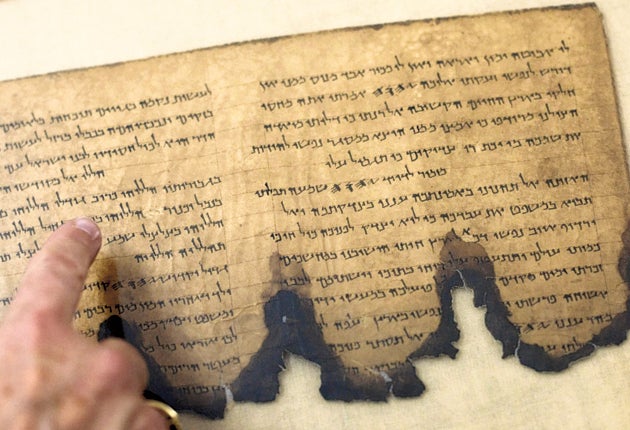Google to bring Dead Sea Scrolls to modern world

Your support helps us to tell the story
From reproductive rights to climate change to Big Tech, The Independent is on the ground when the story is developing. Whether it's investigating the financials of Elon Musk's pro-Trump PAC or producing our latest documentary, 'The A Word', which shines a light on the American women fighting for reproductive rights, we know how important it is to parse out the facts from the messaging.
At such a critical moment in US history, we need reporters on the ground. Your donation allows us to keep sending journalists to speak to both sides of the story.
The Independent is trusted by Americans across the entire political spectrum. And unlike many other quality news outlets, we choose not to lock Americans out of our reporting and analysis with paywalls. We believe quality journalism should be available to everyone, paid for by those who can afford it.
Your support makes all the difference.The 2,000-year-old Dead Sea Scrolls, some of the oldest, historically richest and most fragile religious texts in the world, are to be made available to more than a billion internet users thanks to a plan to put digitised images of the manuscripts online from next year.
One side effect is that the delicate parchment and papyrus fragments on which the text is written will not need to be exposed to the damaging effects of light and air to be read, thanks to the collaboration between Google and the Israel Antiquities Authority (IAA).
Sixty-three years after a Bedouin shepherd first discovered one of the scrolls in a cave near the West Bank village of Qumran, close to the Dead Sea, they will be available to a readership unimaginable to the Essene sect popularly believed to have written them in Hebrew, Aramaic and Greek.
The Scrolls, which among much else contain every book of the Hebrew Bible apart from Esther, are currently kept in darkened, temperature-controlled rooms at the Israel Museum, Jerusalem, where only four specially trained employees are permitted to handle the precious documents. No more than two scholars at a time are allowed to inspect the originals at once.
The IAA has said that the innovation – which, thanks to a new system developed by the US company MegaVision, will allow imaging in the highest resolution possible – will ensure the preservation of the texts for many generations to come. The IAA said the technologies will make it possible to "image the entire collection of 900 manuscripts comprising around 30,000 Dead Sea Scroll fragments".
While the texts, written between the third century BC and the first century AD, have been the subject of fierce academic dispute, most scholars agree that they can shed important light on ancient Judaism and the origins of Christianity. Beside the biblical texts, the Scrolls include treatises on communal living and apocalytic war.
Shuka Dorfman, the IAA's director, said the move represented a "milestone connection between progress and the past" to conserve the texts.
He added: "At the end of a comprehensive and profound examination, we have succeeded in recruiting the best minds and technological means to preserve this unrivalled cultural heritage treasure which belongs to all of us, so that the public with a click of a mouse will be able to freely access history in its fullest glamour.
"We are proud to be embarking on a project that will provide unlimited access to one of the most important archaeological finds of the 20th century, crucial to biblical studies and the history of Judaism and Christianity."
The IAA said that the new technology would also help to "rediscover writing and individual letters that have vanished over the years, thanks to infra-red light and wavelengths beyond" that will bring the writings back to life.
At the same time, the IAA intends to upload additional data which will allow users to perform "meaningful searches... in a number of languages and formats". To begin with the Scrolls will be accompanied by an English translation.
The Palestinians and Jordanians have long claimed custodianship of the documents.
Join our commenting forum
Join thought-provoking conversations, follow other Independent readers and see their replies
Comments